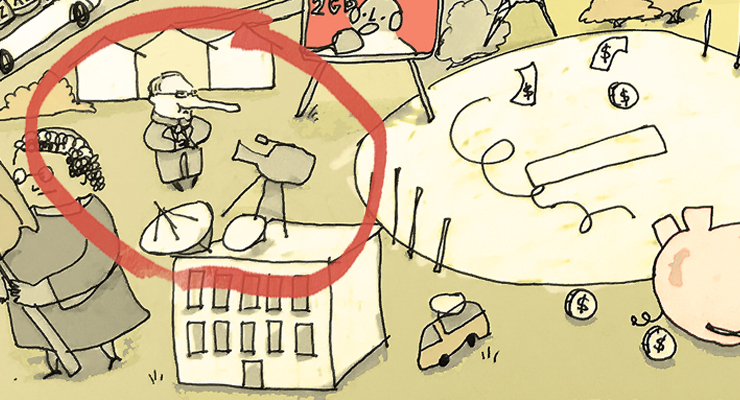All journalists have at least some capacity to increase the pressure on Scott Morrison. But a few are in a much better position to challenge his lies and falsehoods.
How does one cover a politician to whom lying comes easily, or who incorporates it as an important part of their political business model?
It’s been a vexed issue for American journalists confronted by Donald Trump, who not merely lied routinely but who seemed to prefer lying even when it wasn’t necessary — totalling more than 30,000 lies by the end of his presidency, according to The Washington Post.
Part of the reaction to Trump in the US media was a proliferation of fact-checking, and a reduced willingness by journalists — even those engaged in straight reporting — to repeat his claims without alerting readers to their false or contested status.
Some journalists, like Jim Acosta, were prepared to aggressively dispute Trump’s claim. This carried the risk of being punished by the administration and criticised by other journalists — and not merely those in partisan media.
While Scott Morrison hasn’t reached the Trump level of lying simply as a matter of course, the frequency and blatant nature of his deceptions and untruths raises similar questions for the Australian media.
For much of his time as prime minister, the media did not perform well in challenging Morrison’s lies. This has improved in 2021, as more and more journalists — including some working for the Coalition-aligned News Corp — have been sceptical and even critical during media conferences, especially on gender issues.
It was Sky News’ Andrew Clennell who elicited a particularly blatant lie from Morrison when he pressured him on workplace standards within the government. Morrison responded by fabricating a claim about a harassment complaint within News Corp, a lie for which he had to apologise that night.
That incident demonstrated that Morrison is unusually thin-skinned for a senior politician. He reacts aggressively and without discipline when challenged, and doesn’t mind if he is seen as evading questions or talking over journalists. Nor does he mind lying, it seems, by way of attack.
Morrison has increasingly adopted the political tactic of avoiding media conferences when he knows he will face difficult issues. That means fewer journalists have a strong opportunity to engage in the kind of repeat questioning needed to deal with lying.
Moreover, apart from prime ministerial brain explosions, the standard press conference format is not usually conducive to challenging lies: it’s a contest between journalists to see who can get a question in and politicians can pick and choose what they answer and when they end it.
Only journalists conducting long-form interviews with Morrison are in a position to properly challenge his lies. But some struggle even to interrupt his exposition of talking points, letting him run on at length rather than pulling him up when he utters a falsehood. It’s significant that it’s an interviewer from outside the press gallery, A Current Affair’s Tracy Grimshaw, who has landed the most punishing blows on Morrison and his mishandling of gender issues.
Anything less now must be regarded as a journalistic failure — the media must not be party to Morrison’s deliberate strategy of misleading voters, and providing him with a credible platform.
Other journalists, editors and producers who don’t get the opportunity for extended interviews can do better too. While fact-checking units have become common, not all media companies have them or use them effectively. Too many journalists still see their job as relaying statements by politicians that they know to be false, without making any effort to ensure their readers and listeners aren’t misled.
And few mainstream outlets are prepared to regularly use the accurate term “lie” about Morrison, especially in headlines, no matter how blatant his untruths are.
Calling someone a liar comes with a risk of defamation, although reporting responsibly on serious matters of political discussion should be protected by the courts. For a declining media struggling with fewer resources, it’s easier to avoid litigation in Australia’s pro-plaintiff courts by resorting to more wishy-washy terms like “false” or “untrue”. Some media practitioners also cavil at “lie”, insisting that it suggests an element of intent that can’t be proven.
However, a politician who repeats a demonstrably false or widely debunked claim over and over as part of a political strategy that embraces deception as a core element should be called out. Especially a prime minister, who as national leader should be held to some standard of decent political conduct.
It’s not the role of journalists to attack and campaign against prime ministers. But it is their job to hold them to account, even if it’s uncomfortable, and to not be a party to misleading Australians.
Help us keep up the fight
Get Crikey for just $1 a week and support our journalists’ important work of uncovering the hypocrisies that infest our corridors of power.
If you haven’t joined us yet, subscribe today and get your first 12 weeks for $12.
Cancel anytime.

Peter Fray
Editor-in-chief of Crikey







